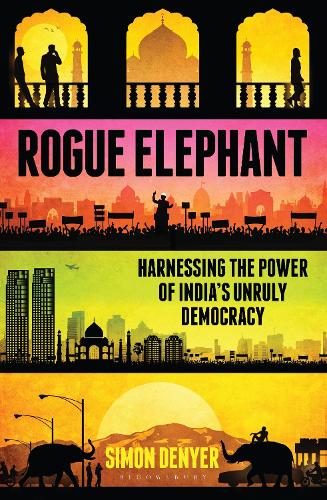
Rogue Elephant: Harnessing the Power of Indias Unruly Democracy
(Hardback)
Publishing Details
Rogue Elephant: Harnessing the Power of Indias Unruly Democracy
By (Author) Simon Denyer
Bloomsbury Publishing PLC
Bloomsbury Publishing PLC
26th March 2014
United Kingdom
Classifications
General
Non Fiction
954.0532
Physical Properties
Hardback
448
Width 158mm, Height 236mm, Spine 40mm
796g
Description
At the beginning of the twenty-first century, India seemed to stand on the brink of an exciting new era. Second only to China as the fastest growing major economy in the world, gleaming shopping malls were being built around the country to service a rapidly expanding middle class, and mobile phones were reaching even the remotest villages. The installation of Manmohan Singh as Prime Minister in 2004 seemed to promise more good times ahead. Singh had unleashed shining Indias potential more than a decade before as finance minister, introducing the liberalising economic reforms that had set the country on a new course towards prosperity. Yet a decade later, the dream has crumbled. A series of corruption scandals has badly tarnished the nations image and undermined its self-confidence, while the economy has slowed and violence against women has dominated the headlines. Their country is no longer shining and Indians are left wondering where the magic has gone. Reporting from across India, meeting activists, farmers, factory and office workers and media figures, and interviewing influential political leaders including Narendra Modi, Rahul Gandhi and Arvind Kejriwal, Denyer exposes the battles taking place all across the nation between powerful vested interests and those trying to foster change. By delving into many of the countrys most troublesome issues, from gender relations to education, from corruption to populist politics, he analyses the Indian malaise and, equally important, discovers signs of new and vigorous life and a deep desire for change. If the worlds largest democracy can control the greed, corruption and bad governance that bedevils it, its future may indeed be truly dazzling.
Reviews
Revealing panorama ... Denyer explores issues through well-told stories of activists, officials, crusading lawyers, and grandstanding television journalists who are fighting to expose and correct abuses, sometimes at considerable peril ... The pervasive misrule that Denyer highlights is outrageous, but he balances it with hopeful signs that Indias democracy can respond to popular pressure. Avoiding clichd notions of India as either South Asian super-tiger or eternal basketcase, Denyers sharp-eyed reportage and analysis convey both the size of Indias problems and the strength of efforts to remedy them * Publishers Weekly *
Author Bio
Born in Portsmouth, Simon Denyer studied Economics at Trinity College, Cambridge, and worked as an economist in the City of London before changing to a career in journalism after a long stint of travelling. As a correspondent for Reuters he worked in numerous places, including New York, Latin America Pakistan, Afghanistan, India and Washington covering various significant events including the 2004 Indian general election and the Asian tsunami. He is now based in Beijing as the Washington Posts China Bureau Chief, as well as being President of the Foreign Correspondents Club of South Asia. @simondenyer
